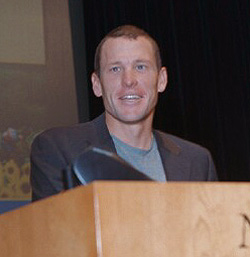History of Lance Armstrong doping allegations
Lance Armstrong doping allegations trace back to the late 1990s, when Armstrong began dominating the world of professional cycling. Armstrong, an American former professional road racing cyclist, won the Tour de France a record seven consecutive times from 1999 to 2005. However, his career was marred by persistent allegations of doping. The controversy surrounding Armstrong's use of performance-enhancing drugs (PEDs) is a significant chapter in the history of professional cycling and sports ethics.
Early Allegations[edit | edit source]
The first major public allegation of doping against Armstrong came in 1999, shortly after he won his first Tour de France. During the race, he tested positive for a corticosteroid, but Armstrong and his team produced a backdated prescription for a cream used to treat saddle sores, which contained the substance. This explanation was accepted by the race officials, and Armstrong retained his title. Despite this, suspicions and allegations of doping continued to follow him throughout his career.
Investigations and Denials[edit | edit source]
Over the years, several former teammates and associates accused Armstrong of doping. In 2004, a book titled L.A. Confidentiel: Les secrets de Lance Armstrong by David Walsh and Pierre Ballester brought forward more allegations, including testimonies from former teammates and associates. Armstrong vehemently denied all accusations and often took legal action against those who accused him.
The United States Anti-Doping Agency (USADA) launched an investigation into Armstrong and his team in 2010. In 2012, USADA concluded that Armstrong had used PEDs over his career and labeled his team's doping program as "the most sophisticated, professionalized and successful doping program that sport has ever seen." Armstrong continued to deny the allegations.
Admission and Fallout[edit | edit source]
In January 2013, Armstrong admitted to doping throughout his cycling career in an interview with Oprah Winfrey. Following his admission, he was stripped of all seven Tour de France titles and banned from professional cycling for life. The International Cycling Union (UCI), the sport's governing body, supported USADA's decision.
Armstrong's admission had a profound impact on the world of professional cycling, raising questions about doping practices and the effectiveness of anti-doping measures. It also led to legal battles, including a lawsuit by the U.S. government on behalf of the U.S. Postal Service, which had sponsored Armstrong's team. Armstrong settled the lawsuit in 2018 by agreeing to pay $5 million.
Legacy[edit | edit source]
The legacy of Lance Armstrong's doping allegations is complex. While he is credited with popularizing cycling in the United States and his charitable work through the Lance Armstrong Foundation (now known as the Livestrong Foundation) has been widely praised, his career is overshadowed by his doping scandal. The Armstrong case has prompted increased scrutiny of doping in sports and has led to stronger anti-doping measures in cycling and other sports.
Search WikiMD
Ad.Tired of being Overweight? Try W8MD's physician weight loss program.
Semaglutide (Ozempic / Wegovy and Tirzepatide (Mounjaro / Zepbound) available.
Advertise on WikiMD
|
WikiMD's Wellness Encyclopedia |
| Let Food Be Thy Medicine Medicine Thy Food - Hippocrates |
Translate this page: - East Asian
中文,
日本,
한국어,
South Asian
हिन्दी,
தமிழ்,
తెలుగు,
Urdu,
ಕನ್ನಡ,
Southeast Asian
Indonesian,
Vietnamese,
Thai,
မြန်မာဘာသာ,
বাংলা
European
español,
Deutsch,
français,
Greek,
português do Brasil,
polski,
română,
русский,
Nederlands,
norsk,
svenska,
suomi,
Italian
Middle Eastern & African
عربى,
Turkish,
Persian,
Hebrew,
Afrikaans,
isiZulu,
Kiswahili,
Other
Bulgarian,
Hungarian,
Czech,
Swedish,
മലയാളം,
मराठी,
ਪੰਜਾਬੀ,
ગુજરાતી,
Portuguese,
Ukrainian
Medical Disclaimer: WikiMD is not a substitute for professional medical advice. The information on WikiMD is provided as an information resource only, may be incorrect, outdated or misleading, and is not to be used or relied on for any diagnostic or treatment purposes. Please consult your health care provider before making any healthcare decisions or for guidance about a specific medical condition. WikiMD expressly disclaims responsibility, and shall have no liability, for any damages, loss, injury, or liability whatsoever suffered as a result of your reliance on the information contained in this site. By visiting this site you agree to the foregoing terms and conditions, which may from time to time be changed or supplemented by WikiMD. If you do not agree to the foregoing terms and conditions, you should not enter or use this site. See full disclaimer.
Credits:Most images are courtesy of Wikimedia commons, and templates Wikipedia, licensed under CC BY SA or similar.
Contributors: Prab R. Tumpati, MD

